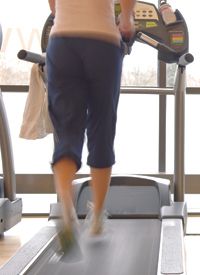Group Exercise Provides Benefits to Patients with Cancer
Group exercise programs are beneficial to survivors of cancer, and can offer motivation from peers to continue living a healthy lifestyle.
Group Exercise Provides Benefits to Patients with Cancer

With more than one third of patients with cancer reporting physical dysfunction, there has been a growing need for programs geared toward improving overall physical wellbeing for this population. A group of researchers from the Roswell Park Cancer Institute and the Indiana University School of Medicine conducted a study to see if one particular program — run by LIVESTRONG and the YMCA – is beneficial.
“It’s a huge need for the cancer survivor population,” Erin L. Ratterman, MS2 at Indiana University School of Medicine and author on the study said in an interview with Oncology Nursing News. “We have a growing population of cancer survivors. People are living longer after a cancer diagnosis and we’re all aware that there are long term effects of chemotherapy and radiation. This program is a great way to address the problems of this growing population and get them closer to where they were before cancer.”
The study observed 158 participants who attended 1.5-hour training sessions twice a week for 12 weeks. The sessions, which included group exercise, yoga, meditation and education on healthy eating, were led by YMCA trainers with a LIVESTRONG certification. Functional Assessments were recorded before and after the program.
Data was available for 112 participants, 100 females and 12 males. The majority of them were between the ages of 51 to 64 (48%). Thirty-four percent were over 65, and 19% were under 40 years old. While the majority of the patients had breast cancer (about 52%), there was also a range of other diagnoses, including lymphoma, ovarian cancer, lung cancer, leukemia, uterine cancer and more.
“Most of these cancer survivors have had some kind of surgical or chemotherapy treatment. They have a common background of making it through something so difficult and they all want to improve on their functionality in the end,” Ratterman said.
Similar to other exercise programs, the study explained, the LIVESTRONG and YMCA program improved all measures within the Functional Assessment. These were: upper and lower body strength, flexibility, balance and 6-minute walking test.
Besides from the physical aspect of the program that was beneficial, researchers also noted that the sense of community also promoted socialization — and sticking to their exercise plan. A post-program potluck brunch was hosted at the conclusion of the experience, and more than half of the participants attended.
“There’s accountability that brings you to the gym when you have friends expecting you to be there,” Ratterman explained. “People can encourage you and become accountability partners in the future, not just during the program.”
The program was hosted at a local YMCA, and even after the 12 weeks were over, 75% of the participants continued to go to the YMCA for exercise, which can have long-term benefits that reach far beyond the 12 weeks of the program.
“Promotion of peer support and education on healthy lifestyle behaviors by the LIVESTRONG at the YMCA program may have an impact on long-term adherence to exercise among cancer survivors,” the study reads.